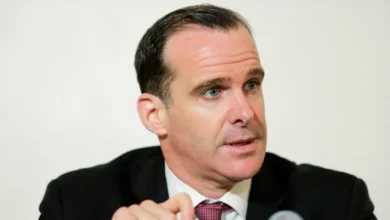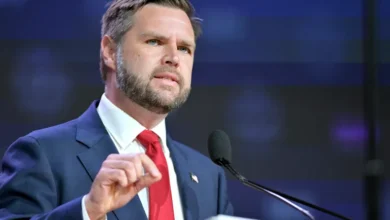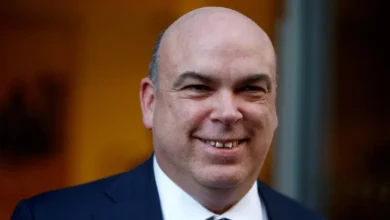Global markets in freefall as Trump digs in on tariff ‘medicine’

United States President Donald Trump has brushed off the market turmoil caused by his sweeping tariffs, likening the measures to “medicine” as panicked investors continued a massive sell-off of global stocks.
“I don’t want anything to go down but, sometimes, you have to take medicine to fix something,” Trump told reporters on board Air Force One on Sunday.“We have been treated so badly by other countries because we had stupid leadership that allowed this to happen. They took our businesses, they took our money, they took our jobs.”
Digging in on his so-called “reciprocal tariffs”, Trump said he would not back down unless other countries balanced their trade with the US.
The US president said he had spoken with many foreign leaders over the weekend who were “dying to make a deal”.
“I said, ‘We’re not going to have deficits with your country’,” Trump said.
“We’re not going to do that, because, to me, a deficit is a loss. We’re going to have surpluses or, at worst, going to be breaking even.”Trump’s comments came as global stocks continued to plummet amid fears of a trade war and economic downturn.
Hong Kong’s Hang Seng plunged more than 13 percent on Monday, its steepest decline in nearly three decades.
Taiwan’s benchmark TAIEX dropped 9.7 percent, its sharpest fall on record, while Japan’s Nikkei 225 closed down 7.83 percent.
In Singapore, The Straits Times Index tumbled more than 7 percent.
South Korea’s KOSPI fell more than 5 percent, while Australia’s ASX 200 closed down more than 4 percent.
European markets continued the sell-off, with the FTSE 100 in London and the DAX in Frankfurt dropping about 5 percent and 7 percent, respectively, in early trading.
US stocks were headed for further steep losses when Wall Street reopens, following a two-day rout last week that wiped out more than $6 trillion in market value.
Futures tied to the benchmark S&P500 were down 2.7 percent on Sunday, while those tied to the tech-heavy Nasdaq-100 were down 3.55 percent.
The US began imposing a baseline tariff of 10 percent on imports on Sunday, with steeper duties of between 11 percent and 50 percent set to take effect against dozens of countries on Wednesday.
The higher tariffs are set to hit both US rivals and allies alike.
China, the US’s main strategic rival and its third-largest trading partner, is facing a 34 percent tariff, while the European Union, Japan and South Korea are bracing for tariffs of between 20 percent and 25 percent.
Retaliatory measures
China last week announced a raft of countermeasures, including a 34 percent tariff on all US imports and restrictions on exports of some critical minerals, while the EU is preparing a list of US imports to target with higher duties.On Sunday, Trump said he was willing to negotiate with China, but any deal would depend on the country eliminating its large trade surplus with the US.
“We have a tremendous deficit problem with China,” Trump said.
The Chinese levies, which come into effect on April 10, “are aimed at bringing the United States back onto the right track of the multilateral trade system”, Vice Commerce Minister Ling Ji told representatives of foreign firms on Sunday, pledging that China will remain a “promising land” for foreign investment.
Some other trading partners of the US, including the United Kingdom, Australia, Indonesia and Taiwan, have ruled out tit-for-tat measures for the time being.
Israeli Prime Minister Benjamin Netanyahu is on Monday set to become the first world leader to raise the tariffs with Trump face-to-face when he makes his second visit to Washington, DC since his return to the White House.
“The two will discuss the tariff issue, the efforts to return our hostages, Israel-Turkey relations, the Iranian threat and the battle against the International Criminal Court,” Netanyahu’s office said in a statement.Amid the market turmoil, analysts have sharply raised the odds of the US entering a recession within the next 12 months.
JPMorgan last week raised the likelihood of a US recession to 60 percent, while S&P Global has put the likelihood at between 30 and 35 percent.
“The size and disruptive impact of US trade policies, if sustained, would be sufficient to tip a still healthy US and global expansion into recession,” Bruce Kasman, JPMorgan’s head of economic research, said in a note, titled There Will Be Blood.Lawrence Summers, who served as treasury secretary under former President Bill Clinton, said the markets were reacting to “what may be the most damaging economic policy” enacted by the US since World War II.
“What’s happening in future markets now suggests that there’s real disappointment that the President is doubling down on his errors,” Summers said on X.
Trump administration officials have played down the risk of an economic downturn despite the market chaos.
“There doesn’t have to be a recession … who knows how the market is going to react in a day, in a week,” US Treasury Secretary Scott Bessent told NBC’s Meet the Press on Sunday.
“What we are looking at is building the long-term economic fundamentals for prosperity, and I think the previous administration had put us on the course toward financial calamity.”










